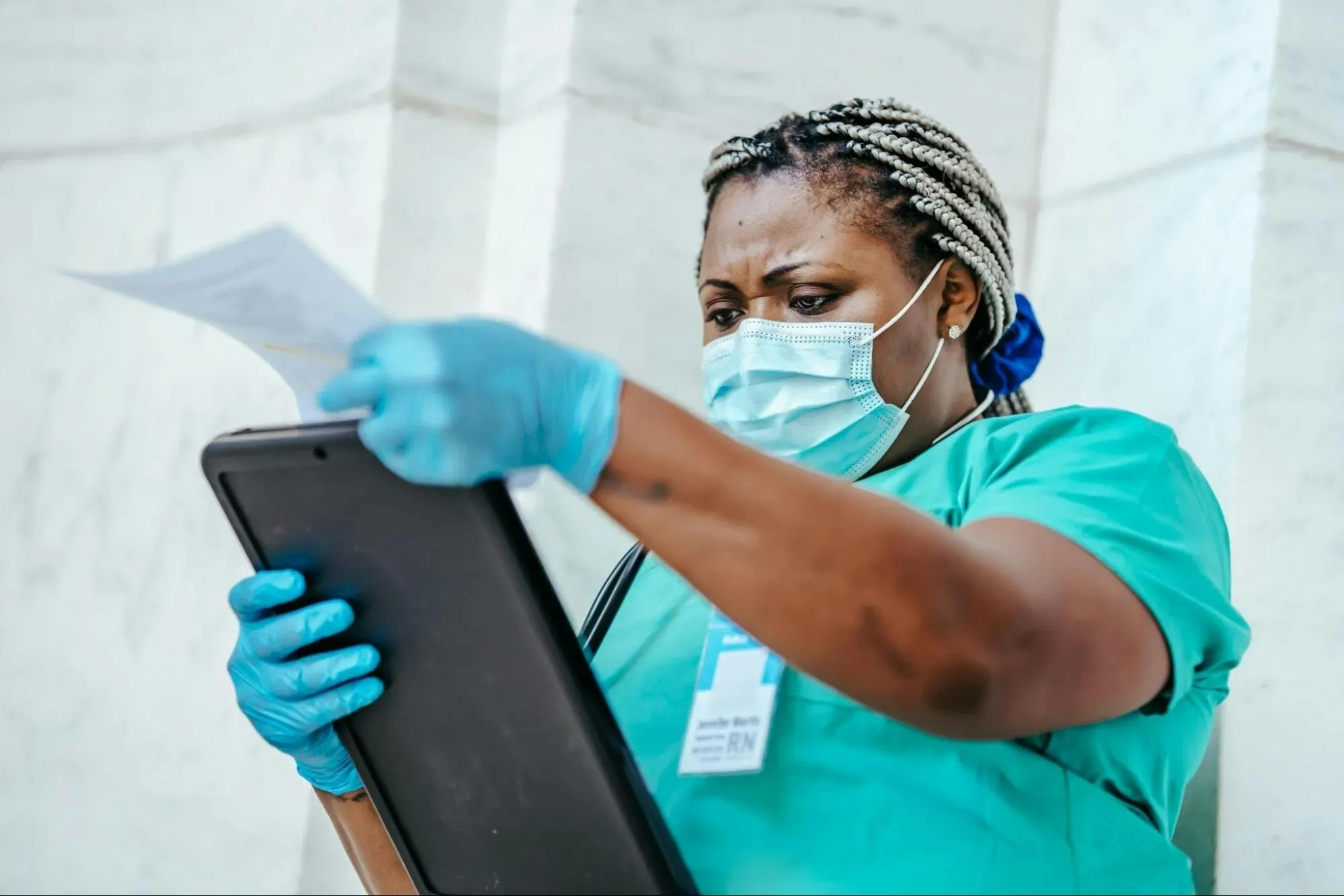What Strategies Do Physicians Use to Manage Stress in High-Pressure Healthcare Settings?
Doctors Magazine

What Strategies Do Physicians Use to Manage Stress in High-Pressure Healthcare Settings?
In the fast-paced world of healthcare, managing stress is crucial for professionals on the front lines. We gathered insights from physicians and CEOs, among others, to share one strategy they've found effective in such high-pressure environments. From identifying your stress triggers to educating on boundaries and self-care, explore these nine expert strategies to maintain your well-being amidst the chaos.
- Identify Your Stress Triggers
- Practice Mindfulness Techniques
- Prioritize Pressing Tasks
- Integrate Mindfulness and Exercise
- Implement Structured Wellness Breaks
- Seek Professional Counseling
- Master Time Management
- Focus on Pacing and Patient Care
- Educate on Boundaries and Self-Care
Identify Your Stress Triggers
The best recommendation I can give to other healthcare workers for how to effectively manage their work-related stress is to start by identifying which specific aspects of your work are your biggest “stress triggers.” As a PA, I know all too well that there are a lot of different potential sources of stress for the average healthcare worker. The job often requires working long and irregular hours, much of which is on your feet, and in high-stakes situations where your actions directly impact a patient’s health and life. Added on top of this are the stressors that all workplaces can have, such as interpersonal conflicts with coworkers, a short staff resulting in overwork, disorganization or poor communication from the institution or leadership, and so on. Each of these stressors is going to impact different individuals in different ways. For me personally, for example, I enjoy being busy and don’t mind physical work, so a high patient load or long shift aren’t the biggest concerns for me. My bigger stress trigger is when managers or colleagues don’t communicate well, leading to confusion and mistakes during the workday that need to be worked through. Knowing this about myself, I can better regulate my emotions and do mental check-ins to assess whether I need to take a break for self-care during these particularly stressful shifts. Conversely, I have coworkers who consistently need to take these self-care breaks when they’re scheduled for a long shift, because that’s a primary stressor for them. Understanding what type of stress impacts you the most can help you to better prepare for it and cope with it when it arises.

Practice Mindfulness Techniques
When you feel stressed, consider mindfulness practices like deep-breathing exercises or stretching to encourage energy flow throughout the body. These techniques help maintain focus on the present moment, even when things start getting overwhelming. They help you manage the physiological symptoms of stress while keeping you grounded, clear-headed, and focused on the task at hand, which is essential in a healthcare environment.

Prioritize Pressing Tasks
Triaging the order of pressing tasks has always been helpful in managing stress in intense environments like the hospital or clinic. When it comes to saving lives, there is no room for errors and mistakes, and so it makes sense to always prioritize the things that need your utmost attention and deal with the less important things later. This way, you become strategic with the way you handle tasks, and you won't be so overwhelmed or spread too thin from handling too many things at the same time.

Integrate Mindfulness and Exercise
I am a therapist with a practice that has 50 clinicians and is often very busy and stressful. One effective strategy I've found for managing stress in a high-pressure healthcare environment is the practice of mindfulness and regular mindfulness-based stress reduction (MBSR) exercises. This approach involves setting aside time each day for mindfulness meditation, where the focus is on being present in the moment, acknowledging thoughts and feelings without judgment, and breathing deeply. Personally, I do this at the end of each day before bed to help clear my mind. This practice helps in cultivating a sense of calm and centeredness, even amidst the chaos of a busy setting. By integrating mindfulness into my daily routine, it becomes easier to approach stressful situations with a clearer mind and a more balanced perspective, reducing the overall impact of stress on my mental and physical well-being. Additionally, mindfulness encourages a non-reactive stance toward stressors, enhancing my ability to respond to challenges with thoughtfulness rather than impulsivity. This strategy not only benefits personal well-being but also positively influences patient care by promoting a more attentive and compassionate healthcare environment. Additionally, I also exercise a lot and don't drink. It helps me to sleep well and to have a natural release for the stress that builds up with work.

Implement Structured Wellness Breaks
In my experience as the founder of Stay Here, a mental-health organization, I've found that embedding a culture of mindfulness and support within the workplace is crucial, especially in high-pressure environments such as healthcare. One strategy that has proven effective is the implementation of regular, structured wellness breaks throughout the day. These are short periods dedicated to mental-health exercises such as guided meditation, breathing techniques, or even brief outdoor walks.
Through our work at Stay Here, we've seen how these wellness breaks can make a significant impact. Data and feedback collected from participants in our programs show a noticeable decrease in reported stress levels and an increase in productivity and job satisfaction. It's a testament to the idea that taking time to mentally recharge can improve not only individual well-being but also enhance team dynamics and overall workplace atmosphere.
Moreover, creating a support system that encourages open conversation about mental-health struggles is vital. We've facilitated peer support groups within organizations, providing a safe space for employees to share their experiences and coping strategies. This fosters a sense of community and belonging, which is especially important in high-pressure environments where individuals might otherwise feel isolated with their stress.
Additionally, emphasizing the importance of individual mental-health plans has been key. Encouraging employees to identify what specifically triggers their stress and what actions they find most effective in managing it allows for a more personalized approach to stress management. This might include setting realistic daily goals, establishing clear work-life boundaries, or incorporating specific relaxation techniques into their routine.
From our extensive work in raising mental-health awareness, it's clear that a combination of proactive wellness practices, promoting open dialogue about mental health, and encouraging personal coping strategies can significantly mitigate stress in high-pressure healthcare environments. These approaches not only support individual health-care professionals but also contribute to a more resilient healthcare system overall.

Seek Professional Counseling
The most important way for me to manage stress in a high-pressure healthcare environment is to have a counselor to talk to about it. You always feel such a responsibility, and sometimes that's hard to describe, especially when a treatment fails. Having a professional to discuss and work through that at times helps me keep my balance and perspective.

Master Time Management
Time management wins every time. Healthcare is stressful. If you don't structure your time and implement boundaries, you will never have time to breathe. Time-blocking can give you your time back.

Focus on Pacing and Patient Care
As an ER physician, I've noticed the discussion around "stress" becoming the most prominent issue in our field. Emergency medicine is notorious for burnout. It's the non-patient-care aspects that often weigh heaviest. This includes juggling multiple patients, personal-life stressors that can seep into the workplace, navigating administrative metrics that seem disconnected from our real goals, and of course, documentation.
Interestingly, the actual "high-stress" patient care is what I find the most rewarding and stress-free. The attempts to address burnout often miss the mark, like the clichéd pizza parties or the ironic 'mandatory unpaid burnout prevention classes' that add to our workload rather than alleviate it.
For me, the key to managing stress isn't about pushing harder or caffeinating through my shifts. It's about pacing. Understanding my capacity for mental exertion is a skill in itself. I know my limit—how much I can push and for how long. I can tell when I'm pushing too hard and the day is wearing on me. I know when I need to slow down.
This doesn't always play well with productivity metrics; taking time to truly connect with patients might mean seeing fewer in an hour. But the trade-off is worth it.
This approach—focusing on quality care and meaningful patient interactions—might not fit every metric or expectation, but it's how I've found balance. It sounds cliché, but I get joy from making a lasting difference with my patients, not from writing notes and adhering to metrics. By handling stress day by day, I quite literally feel different after each shift and keep burnout at bay in the long run.

Educate on Boundaries and Self-Care
Model, Teach, and Honor Boundaries: When clinician teams know how to honor boundaries, create manageable workloads, and sustain themselves in high-demand environments, it reduces error rates, improves safety, and outcomes. Provide educational training on personal leadership, stress management tools, and ways to communicate and set work boundaries. Support clinicians and care providers with structured breaks throughout the day. Educate teams on the negative impacts of burnout, moral injury, and states of extreme fatigue. Proactively offer permission and shift mindsets around overwork. Utilize and facilitate change management to address work structures that keep teams stuck. All of this will drive better teamwork, improve decision-making, and communication too.
